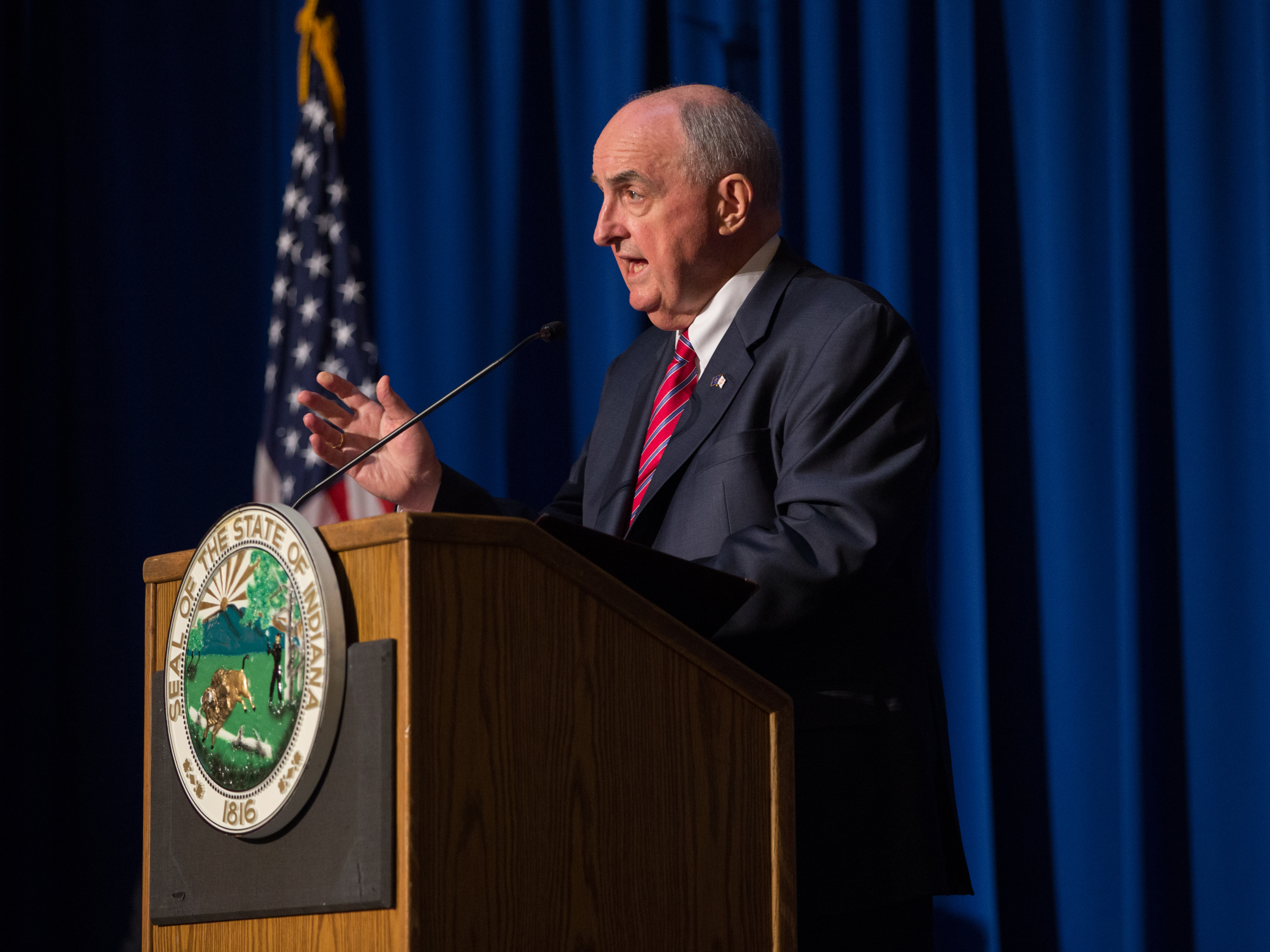As one of the nation’s leading public research universities, Indiana University has, in recent years, made powerful investments in research designed to inform public policy; to establish new protocols for the prevention, treatment, control, and cure of disease, pain, and suffering; and to contribute to the quality of life in Indiana and state and national prosperity through the creation of new industries and jobs.
One of the most visible of these investments, as Vice President Cate mentioned, is IU’s Grand Challenges Program which, in the years leading up to IU’s Bicentennial in 2020, will invest in a number of major multidisciplinary research projects aimed at finding solutions to the “grand challenges” of our time—solutions that will provide major improvements in the quality of life for the people of the state of Indiana and beyond.
This morning, I am proud to announce that Indiana University’s third Grand Challenge Initiative will be “Responding to the Addictions Crisis.”
Distinguished Professor Robin Newhouse, Dean of the IU School of Nursing, will serve as the initiative’s Principal Investigator.
As you know, drug addiction is a major public health crisis that is taking an increasingly severe toll on the health of far too many Hoosiers and devastating communities throughout Indiana. In 2014, more than 1,100 Hoosiers died from drug overdoses, marking a 500 percent increase since 1999 and placing Indiana 15th nationwide for drug overdose fatalities. Indiana is one of four states where the fatal drug overdose rate has more than quadrupled since 1999. In fact, drug overdoses have risen so sharply in Indiana that they overtook the number of motor vehicle deaths in 2008. The situation is so severe nationally that it is expected to result in a decrease in the average life expectancy of Americans—something usually only associated with countries ravaged by war, famine, or epidemics. And in 2016, more people died from drug overdoses in the U.S. than the total number of Americans killed in the Vietnam War.
Through IU’s vitally important new initiative which we announce today, the university will partner with Governor Holcomb and the State government; IU Health; Eskenazi Health; and with other organizations to urgently address the pervasive and grave substance abuse crisis in Indiana and throughout the United States. This initiative will be the nation’s largest and most comprehensive state-based response to the opioid addiction crisis, and the largest anywhere led by a university.
Governor Holcomb has identified addressing the substance abuse crisis as a key priority for the state, and has identified aligning the resources of the state, including its universities, as a critical step in achieving that priority. IU’s efforts to respond to the addiction crisis will be aligned in this way with state and federal government efforts, and will include collaboration with the Indiana congressional delegation, local communities, industry, NGOs, patient groups, and many others. IU greatly appreciates the opportunity to partner with Governor Holcomb, the State, IU Health, Eskenazi Health, and others on this important initiative.
This new Grand Challenge initiative will have a budget of $50 million over five years. Of this, around $13 million will be immediately deployed over the next six months in over 10 separate projects in the following areas.
- IU will work to address key issues in substance abuse prevention, early intervention, treatment, recovery, and enforcement.
- We will expand education, training, and certification to address the significant shortage of addictions professionals, not just in medicine, but across health care, social work, and related professions.
- We will bring to bear IU’s considerable expertise in data collection and analysis to turn data into actionable intelligence for health providers, government agencies, employers, and community organizations.
- We will deploy IU’s expertise in policy analysis, economics, and legal reform to reduce the availability of opioids in medicine cabinets and on the street, and to inform decisions made by our state’s elected officials.
- We will focus IU’s basic, applied, and translational science on a better understanding of addiction mechanisms and expand research into non- or less-addictive treatments for pain to reduce the demand for illicit substances, and ultimately reduce the prevalence of substance abuse disorders.
- And we will focus on community and workforce development, and expand IU’s partnerships with communities to enhance their responses to the addiction crisis.
This initiative will also fund the hiring of 10 new IU faculty members, various other scientists and technicians, and the work of dozens of students each year on IU’s campuses.
This initiative will also leverage IU’s extensive state-wide footprint, including the IU School of Medicine and all of IU’s other health science schools, as well as all of IU’s regional campuses. It will bring together IU’s formidable and extensive clinical, research, and educational capabilities, working in partnership with IU Health, to achieve maximum impact in addressing this urgent state and national crisis.
It will also leverage the vital expertise concerning these problems in other units and schools within the university, including the School of Public and Environmental Affairs, the Maurer and McKinney Schools of Law, and the Department of Psychological and Brain Sciences in Bloomington’s College of Arts and Sciences.
Indiana University is certainly not immune to this crisis. We are all hearing almost daily about more deaths and impacts of this devastating crisis. It affects IU faculty, staff, students, alumni, and their families, friends, and neighbors. People are dying. We must act! Now is the time to bring to bear the resources of all IU campuses to help address and mitigate this destructive and deadly public health crisis.
And now, I invite you to turn your attention to the screen(s) for a video highlighting the “Responding to the Addictions Crisis” Grand Challenge initiative.


